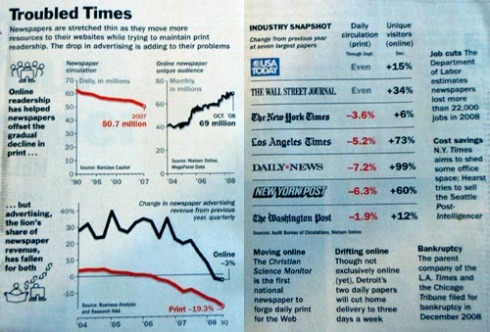Taking a sidestep from the leadership and financial disasters as of late, I read this intriguing article published earlier this month in the New York Times, called the “Brave New World of Digital Intimacy“. It offers great socio-anthropological insights into these new social awareness tools and delves into all aspects of their use. Some excerpts to follow.
On the aggregate phenomenon of Twitter/Facebook: “This is the paradox of ambient awareness. Each little update — each individual bit of social information — is insignificant on its own, even supremely mundane. But taken together, over time, the little snippets coalesce into a surprisingly sophisticated portrait of your friends’ and family members’ lives, like thousands of dots making a pointillist painting. This was never before possible, because in the real world, no friend would bother to call you up and detail the sandwiches she was eating…”
On the formation of weak ties and the pro/cons thereof: “As I interviewed some of the most aggressively social people online…many maintained that their circle of true intimates, their very close friends and family, had not become bigger. Constant online contact had made those ties immeasurably richer, but it hadn’t actually increased the number of them; deep relationships are still predicated on face time, and there are only so many hours in the day for that. But where their sociality had truly exploded was in their…loose acquaintances, people they knew less well.”
Why maintain an online presence?: “It is easy to become unsettled by privacy-eroding aspects of awareness tools. But there is another — quite different — result of all this incessant updating: a culture of people who know much more about themselves. Many of the avid Twitterers, Flickrers and Facebook users I interviewed described an unexpected side-effect of constant self-disclosure. The act of stopping several times a day to observe what you’re feeling or thinking can become, after weeks and weeks, a sort of philosophical act. It’s like the Greek dictum to “know thyself,” or the therapeutic concept of mindfulness….Having an audience can make the self-reflection even more acute, since, as my interviewees noted, they’re trying to describe their activities in a way that is not only accurate but also interesting to others: the status update as a literary form.”
—-
Social media networks are slowly, but surely infiltrating our lives. There have already been situations in which social media trumps traditional media in both accuracy & efficiency for the distribution of breaking news and emergency information.
—-
“I’m not sure what we should call this group of apps. Presence updaters? Microbloggers? Social networkers? ” [Jaiku/Twitter/Facebook/Kyte/Plaxo – Pay Attention! via WebProNews]
“Personal publishing is more than just text, it spans all media…Sites like MySpace and Facebook are better bigger than blogging sites because they enable people to connect, communicate and share with each other in richer and easier ways than blogging does.”
[Why Facebook is Bigger Than Blogging via 25hoursaday]
Social media networks take advantage of and cleverly fulfill the human need to communicate. At the moment, the only problem is that there are so many options – these social media websites tend to have distinct functions – that your online presence is doomed to be fragmented. You’d get social-media-overload from trying to maintain accounts on WordPress and Facebook, Twitter, Youtube, Dopplr, PlaceShout, MySpace, Jaiku or any combination of the slew of online applications available for communication, collaboration, multimedia, and entertainment. The other problem would be all of your friends’ updates saturating your mailbox or friend-feed.
“At what point do we finally peak and have some universal social media dashboard?…The Facebook news feed comes closest, but it only highlights some of the updates even from people I want to follow closely.” [To Twitter or Not to Twitter? via WebProNews]
“One day, I can imagine Google, Yahoo, and Microsoft offering full search/social/traditional media advertising packages that pull all of these things under one roof – a managed campaign offering.” [Microblogging: What Is It Good For? via WebProNews ]
—-
What we need next is something to organize all these different applications in one place. Facebook has the potential to become that all-encompassing social media network that will aggregate and sieve through everything. I suspect that in the future everyone will be connected to the internet 24/7, which by then, will be massively mobile social media network feeding us updates about people and events happening around the world…in effect, feeding us reality. (At least, that’s what I thought, before the layout changed and I was no longer able to find anything I wanted to access! Darn you, Mark Zuckerberg.)
We will be constantly connected to each other. Together we will form so many intersecting points in a politico-econo-socio-cultural web. The datastream will be instantaneous, perpetual and unbearable unless we are able to effectively collect & filter out all the noise. Something infinitely better than Facebook is necessary; there stands an incredible amount of profit for whomever can come up with the next best social news feed.
—-
Monday, September 22, 2008
Dow Falls More Than 370 Points Amid Bailout Skepticism
Stocks fell sharply and oil prices spiked, closing up more than $16 a barrel, as a battle seemed to be shaping up in Washington over the details of the biggest government bailout in history. The dollar also slid against the euro.
[via the NYT]
Still worried about the 700 billion dollar bailout plan, which now includes foreign banks. There’s a standoff in Congress. Take your time, guys, because that’s an incredible price-tag.


You must be logged in to post a comment.